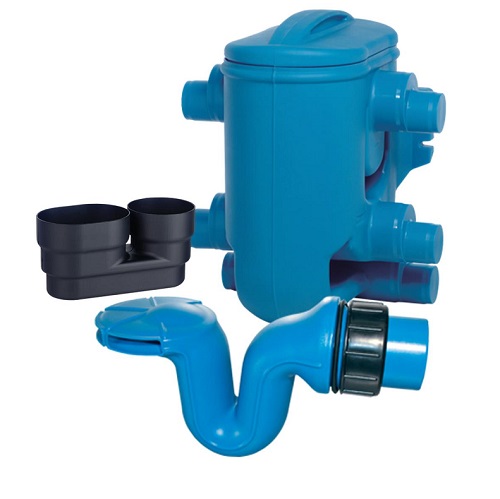Rainwater Harvesting Kit C

Details
The kit includes:
- Twin Filter
- Overflow Siphon
- Calmed Inlet
The Rainwater Harvesting Kit C will service a roof area of 800m² and is better suited for toilet flushing, general garden use and gives a better quality of filtered water. This kit would be best suited to a tank between 5,500-20,000 litres
The need to store and re-use, or harvest rainwater is becoming increasingly necessary due to falling supplies and increasing prices of fresh water. For many everyday uses such as dish washing, watering the garden or washing the car, we don't need to use purified drinking water from the tap.
That is where rainwater harvesting makes sense. Rainwater is a free resource and the rainwater that falls on to your roof can be collected, filtered and then stored in a tank ready for use in a number of applications. Although not suitable for drinking, rainwater can be used in homes for flushing the toilet, in washing machines, for watering the garden, car washing etc.
The benefits of rainwater harvesting are that it reduces flooding and overloading of sewers, prolonged appliance lifetimes and beautiful, lush green gardens.
Guidelines for sometypical applications
| Application | Gallons | Litres |
| One person | 50 / day | 250 / day |
| Two people | 80 / day | 360 / day |
| Three people | 145 / day | 435 / day |
| Shower | 200 / hr | 15 / min |
| Fill bath | 30 / day | 140 |
| Flush toilet | 1 to 3 | 5 to 15 |
| Sprinklers | 180 / hr | 14 / min |
| 1/2" Tap @ 20psi | 600 / hr | 45 / min |
| 3/4" Tap @ 20psi | 1000 / hr | 75 / min |
| Cattle per day | 10 to 20 | 45 to 90 / day |
| Milking cows | 30 to 40 | 135 to 180 / day |
| Sheep / Pigs | 1 to 2 | 4 to 9 / day |
Choosing your tank volume
It is important that your system meets all the requirements you need from it. The following rule of thumb can be used a as rough calculator. For each person, you need a tank volume of at least 1500 litres. For a tank with a volume of 1000 litres, a roofed surface of 15m² is necessary.
How it works
The rainwater is collected in a 3 way cleaning process. Only rainwater collected from rooftops should be stored in you tank.
The first cleaning step in the rainwater system is the filter. The rainwater flows through your down pipe and enters the top of the filter. This is where any debris such as leaves, moss or twigs are seperated from the water. The cleaned water continues to flow through the filter and down into the tank below, while the dirt is washed out of the filter and back into the downpipe headed for the sewer. The filters have removable cartridges to make cleaning of the filter much easier. The filter should be cleaned twice a year depending on contamination.
The second cleaning step takes place in the calmed inlet. The calmed inlet ensures that oxygenated water is added to the lower layers of the stored water in the tank. The oxygenated water prevents anaerobic reducing conditions forming in the tank and ensures that the water stays fresh. The calmed inlet also allows water to enter the tank without disturbing the water that is already there.
The third cleaning step involves the overflow siphon. Any particles that are lighter than water, such as flower pollen, float slowly to the water surface where the overflow siphon will remove this layer.
